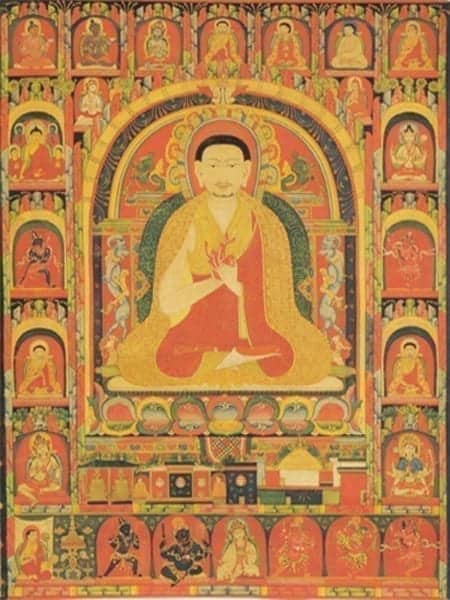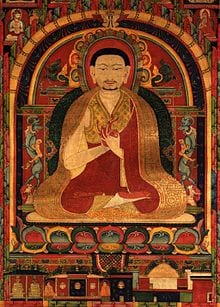When we refer to the meditation chart, we always return to the ground. Meditation masters remind us that we should spend at least a few minutes in every session reflecting on the four mind changings. In the the first year of your practice, you have begun to establish that habit. But, we can’t assume we’re done and walk away from this core practice. So, please remember as you begin this second year of study, contemplation and meditation, that these reflections are vital to our awakening.
In the previous study unit, “Continued Contemplation of the Four Mind Changings”, Phakchok Rinpoche spoke of the importance of really integrating these contemplations with our experience. Because this step is so crucial, in this unit, we return to the topic with a classic presentation.

Here, we have extracted the instructions from the Mahamudra meditation manual entitled The Amṛta Of Essential Accomplishment, compiled and composed by Taklung Tangpa Tashi Pal, the founder of the Taklung Kagyu. These instructions include specific reflections, suggested verses for recitation, and inspiring quotations.
We suggest that you return regularly to this page—especially if you feel uninspired or if you recognize that you are quickly skipping through these important contemplations
Lineage of the Teachings
The teachings of the Kagyu were passed down from the dharmakaya buddha Vajradhara to the mahasiddha Saraha. Saraha then transmitted them to Maitripa—and from there they flowed through Tilopa, Naropa, Marpa, Mila, and Gampopa. One of Gampopa’s main students was named Pagmodrupa. And one of Pagmodrupa’s main students was Taklung Tanga Tashi Pal (1142-1210), “the one with supreme devotion”.

He was the founder of the precious Taklung Kagyu lineage which has been transmitted without break down until the present day. In Tibet, the main seat of the Taklung Kagyu is Riwoche in Kham where the lineage is upheld and passed on by three main masters: Kyabgön Shabdrung Rinpoche, Kyabgön Jedrung Rinpoche, and Kyabgön Phakchok Rinpoche.
Meditating on the Difficulty of Obtaining the Freedoms and Riches
In order to enter fully into the stages of spiritual practice, a fortunate individual [should go] to a solitary place endowed with the right qualities and divide [their time] into [sessions]. At best one should divide one’s time into three sessions in the day and three sessions in the night making six sessions; middling, into five sessions; or at the least four sessions. In the case of [the latter], even though you still have other things you need to do, postpone the larger things and discard the smaller things. Having resolved that there is nothing superior for one to do than this, sit on a comfortable seat with your legs in the bodhisattva posture, your two hands in the mudra of meditative equipoise, with a straight body and so forth. Keep the body posture a little bit and with a joyful open mind, take delight in engaging in spiritual practice.
Then, thinking, “In order to establish all old mother sentient beings at the state of perfect buddhahood, I must train in Mahamudra,” acknowledge the unsurpassable unrepayable kindness of the extremely kind sublime root guru who teaches one the Dharma.
As spoken by Lord Laughing Vajra, Milarepa:
Having being born into this family of siddhas, the heir lineage of the great Lord Naro [Nāropā], why stay in the midst of worldly people? Go to a solitary mountain retreat. If you don’t do that, obtaining a human body is of little meaning, [and] the precious oral instructions will go to waste.
As he said, a precious human body that is free from the eight un-free states and endowed with the ten riches of self and other is extremely difficult to obtain. Therefore, now when by sheer coincidence we have obtained [a precious human body] this one time we must [use it to] obtain unsurpassable enlightenment.
Even if that doesn’t happen, if right now we don’t make sure to gain a foothold on the path, from our next life onwards we will wander endlessly in saṃsāra in the three lower realms and so forth without even the slightest bit of free will.
Therefore, bless me that I may be able to make this human body meaningful and be able to practice the Dharma wholeheartedly! Reflect again and again until you are able to give rise to intense certainty.
If you wish, recite the following words:
These freedoms and riches are extremely difficult to obtain.
If right now enlightenment is not obtained.
Later on I will have not the slightest bit of control over where I am born.
Grant your blessings that I may make these freedoms and riches meaningful!
How to Reflect on Death and Impermanence
The Great Lord Milarepa said:
This impermanent life is like the shadow of a setting sun. Though [the sun] goes further and further away, [the shadow] comes closer and closer. I don’t see any escape.
As it was said, the end of birth is nothing other than death and there is no certainty as to the time of death. At the time of death, there is not the slightest reason whatsoever that wealth, courage, beauty, relatives and friends, retinues and servants and so forth will not deceive you. Therefore, give up all concerns for activities of this life.
Think:
“From this day on I will concentrate my mind solely on the Dharma!” and make a heartfelt resolve.
Recite:
The end of birth is nothing other than death and there is nothing reliable in this transient life.
Therefore, grant your blessings that I may give up concerns for unnecessary things
And am able to take death to heart.
Reflecting on Karmic Cause and Effect
The Mighty Yogi Milarepa said:
If you do not reflect properly on the causes and results of virtuous and non-virtuous karmas, the sufferings of the lower realms are unbearable. Therefore, even towards the most subtle of ripenings guard yourself with carefulness and mindfulness.
Even though you are courageous and powerful, you cannot deceive the fruits of the virtuous and evil actions you perform, happiness and suffering, that follow after you. It is certain that the fruit will ripen on the body and mind of the agent. Even though I have, until now, pretended to enter the door of the sacred Dharma, I have no real assurance or certainty that my mind is in accord with the Dharma. Therefore, from today onwards, fearing that my mind will fall into the negative emotions and I will perform actions motivated by them, I will make my actions of body, speech, and mind solely virtuous. Reflect in this way again and again.
Recite:
The karmic effects of virtue and evil follow after you without fail.
They ripen on the body and mind of the agent, not on anything else.
Therefore grant your blessings that I guard what is to be accepted and rejected like my own life.
Meditating on the Faults of Saṃsāra
The Buddha Milarepa said:
Even if everything is brought together it is futile.
The things of saṃsāra are futile.
From this futile nature,
Now I the yogi must accomplish something meaningful!From the peak of saṃsāra down to the hell of incessant torment, like a blazing fire pit, tormented by the three sufferings there is not the slightest moment of happiness. I supplicate you to grant your blessings that, like a heinous criminal gaining freedom from a dungeon, I give rise to revulsion [towards saṃsāra] from the depths of my heart.
Recite:
From the peak of existence down to the hell of incessant torment
All abodes of saṃsāra are like a pit of fire.
Bless me that I give rise to revulsion from the depths of my heart
Towards this existence tormented by the three sufferings.
The above instructions were extracted from The Amṛta Of Essential Accomplishment by Gelong Ngag-Wang Tashi Paldrub. Translated by Samye Translations.

Responses